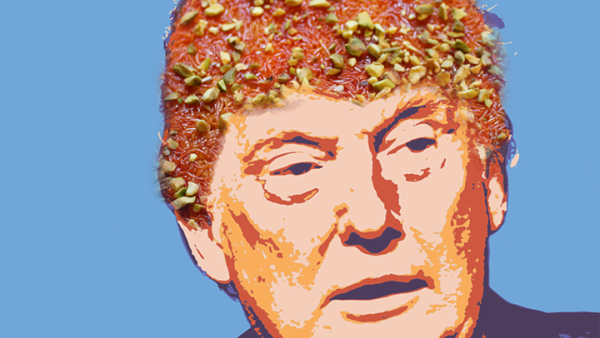by Rosie Alfatlawi
“Trump the kunafah” is how the young man described him to English-language Turkish channel TRT.
Kunafah is a traditional Palestinian dessert made with white cheese, covered in orange-colored pastry and drizzled in sugar syrup.

The tag seems to have captured imaginations online, as a video of the interview has gained 8,400 likes since it was posted Monday.
Asked about Trump’s decision to move the U.S. embassy in Israel to Jerusalem, the teen said: “It’s a very big mistake that they make Jerusalem, our capital, their capital.”
“Especially that ‘kunafah’ Trump, if he wants to take Palestine we will continue resisting, and the intifada.”
While the move has provoked considerable anger, this clip is an example of a different kind of response, unlikely to be reported in media keen to perpetuate the “angry Arab” stereotype.
That is to say, humor. And commenters online certainly saw the funny side.
Many claimed to be offended by what they saw as an unfair comparison to the vastly popular dish, which is eaten across the Arab world.
Others suggested what they saw as a better likeness for the U.S. president.
The comedy did not get in the way of politics, however.
These jokes are a far cry from headlines full of phrases like “tempers flare,” “Palestinians rage” and “fury.”
Lighter moments like this reflect that much media coverage of Palestinian protesters fail to humanize them as individuals seeking their rights - and capable of humor, joy and sadness, as well as rage and anger.
On a serious note, kunafah is an element of Palestinian culture and has therefore been vulnerable to Israeli attempts to erase their collective identity.
Along with hummus, falafel and maftoul, kunafah is a foodstuff that has been erroneously promoted as Israeli in an act of cultural appropriation.
Trump the Kanafeh (btw that's NOT Israeli. Just not. Guard - even the tiny things of - your heritage Pals) pic.twitter.com/1kdFSOqbvw
— AmndA (@qAmndAp) December 11, 2017
Some supporters of Israeli have tried to deny Palestine’s existence as a national identity to justify their attempts to force Palestinians from the land. Ignoring or obscuring the presence of a Palestinian culture, including a cuisine, is one way to justify this narrative.







